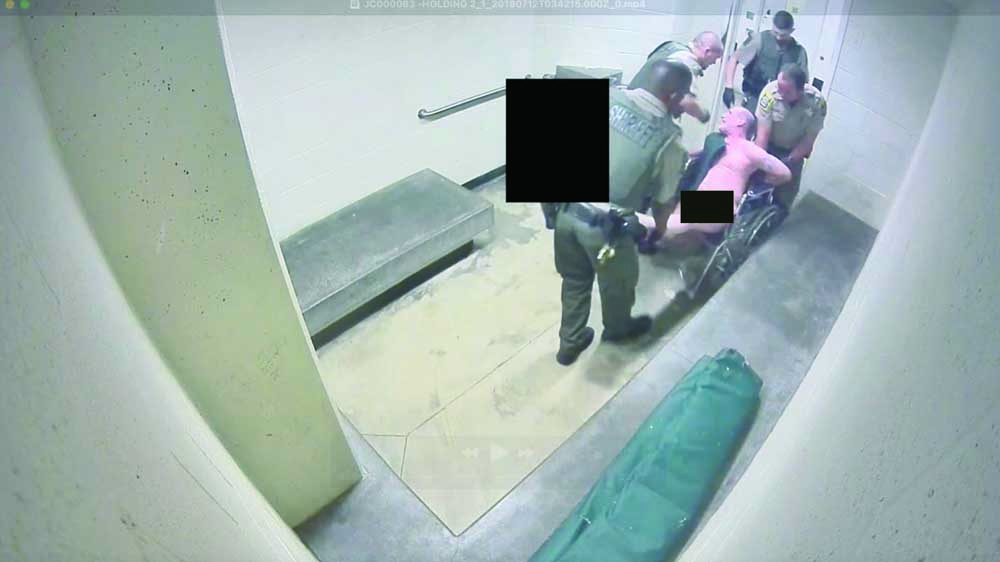Jury to decide if slap of Jackson County Jail inmate was ‘policy or informal custom’
Published 1:00 pm Sunday, August 4, 2024

- A federal judge denied the county's objections and affirmed an earlier judge's opinion on claims filed against the Jackson County Jail by John Lee Malaer, who claims jail staff failed to accommodate for his medical needs and that he was battered by corrections deputies on July 11, 2019.
A federal judge determined that a jury should sort out the “significant disputes of material fact” in a civil rights lawsuit filed by John Lee Malaer, a paraplegic man who claims he was mistreated at the Jackson County Jail five years ago.
Trending
Those disputes include one surrounding a slap captured on camera July 11, 2019, at the hands of Deputy Brian Kolkemo — particularly whether the alleged excessive force incident stemmed from “policy or informal custom,” according to an opinion and order filed July 19 by Magistrate Judge Mark D. Clarke in U.S. District Court in Medford.
Clarke’s opinion and order, reissued Wednesday to the Article III judge assigned to the case, Judge Michael McShane, is the latest development in a lawsuit Malaer first filed Jan. 9, 2020, against the county alleging excessive force, discrimination and violations of his Americans with Disabilities Act rights.
Malaer is suing Kolkemo personally for violating Malaer’s Fourth and 14th Amendment rights, arguing the deputy engaged in excessive use of force, used pain compliance techniques and aggressively manipulated Malaer’s body in unnecessary and harmful ways.
Trending
He is also suing the county for alleged unconstitutional policies and practices, arguing that the rights violations stemmed from county policies, procedures or informal customs, and for alleged Americans with Disabilities Act violations stemming from failures to provide Malaer with a wheelchair and wheelchair-accessible facilities, including a bed, toilet, sink and water.
No comment from county, Malaer’s lawyers
Senior Deputy County Administrator Joel Benton said in an email to the Rogue Valley Times that the county does not comment on pending litigation as a matter of practice.
Malaer’s lawyers — Alicia LeDuc Montgomery of Battle Ground, Washington, Michelle Burrows of Lake Oswego, Jesse Merrithew of Portland, and Norah Van Dusen of Portland — did not respond to a message seeking comment.
Malaer claims jail staff, following his arrest on a charge of disorderly conduct, failed to accommodate for his medical needs after Medford police took his bag containing medication and catheters used to treat his neurogenic bladder condition. He claims this caused him to urinate on himself and his bedding at the jail multiple times, that he was left in a cell without a wheelchair for roughly five hours — leaving him severely dehydrated and forced to drink water from the toilet — and that he was battered by corrections deputies.
According to the case synopsis, Medford police arrested Malaer after reports he was outside Lumpy’s bar on Riverside Avenue in Medford throwing rocks. Malaer asserts that the battery in his electric wheelchair was dying, and that he was throwing pebbles in an effort to get help from someone to move him closer to a bus stop. When police arrived, a shouting match with officers ensued, leading to probable cause to arrest him for disorderly conduct. The charge was ultimately dropped by the Jackson County District Attorney’s Office.
Malaer’s case separately includes bifurcated claims against Medford police accusing the city of three Americans with Disabilities Act violations. Medford police were severed from Jackson County in the case in 2021. The court ruled in summary judgment that Malaer’s arrest was lawful and that police had probable cause to take him into custody.
Other alleged ADA violations
The three lingering Americans with Disabilities Act claims against the city are based on grounds a jury could determine that Malaer was arrested because he was physically unable to leave the scene when an officer ordered him to leave; that officers mistook PTSD disability symptoms for criminal activity; and that the patrol SUV was not equipped to accommodate a paraplegic arrestee, Malaer claims.
Clarke’s latest ruling focuses on Jackson County defendants and Malaer’s treatment at the jail. Each party sought decisions on summary judgment, many of which Clarke denied in his July 19 opinion and order, stating, “Both parties raise questions of fact, and they are both entitled to have their case heard and decided by a jury.”
“Significant disputes of material fact exist in this case, particularly as to whether Jail Staff knew or should have known of Plaintiff’s (Malaer’s) medical needs, whether jail deputies used excessive force in attempting to subdue Plaintiff’s verbal combativeness during intake, especially considering his disabilities and medical fragility, and whether jail staff failed to accommodate Plaintiff’s disabilities in depriving him of his wheelchair in his cell, which in turn deprived him of access to the toilet and clean drinking water,” Clarke wrote.
Malaer claimed he was denied medical care at the jail, but Clarke cited differing accounts as a reason the court can’t weigh in and the claims should be decided by a jury. As one example, both sides agree that Malaer screamed, “Take me to a hospital,” but a nurse on duty stated in her evaluation that he “refused to answer any medical questions and stated he did not have any medical issues despite having an electronic wheelchair.”
“F— you. Take me to the hospital,” Malaer is reported to have told deputies during the intake process.
Clarke determined that questions of fact preclude him from making a summary judgment as to Malaer’s Americans with Disabilities Act claims against the county.
“Defendants claim that Plaintiff did not indicate these needs at intake or on the intake forms, nor did he request them verbally. They also claim that staff provided Plaintiff with a wheelchair after five hours inside the cell, and that he did not need one prior to that because he was merely sleeping in the cell,” Clarke wrote. “The court cannot resolve these factual issues. Plaintiff and defendants are entitled to have the facts determined by a jury.”
The judge was less amenable to an argument from the county claiming that Malaer had no concrete, particularized injury sufficient for standing in the case.
Clarke’s response: “The idea is nonsensical.”
“Plaintiff has alleged that he suffered the particularized injury of being subjected to Defendants’ deliberate indifference, having his medical needs ignored and exacerbated, experiencing seizures and bladder spasms while naked on the floor of a concrete jail cell, without access to proper clothing, a toilet or drinking water,” Clarke wrote. “His alleged injury in fact is actual, particularized and caused by Defendants’ actions or inactions.”
Policy, procedure or internal custom?
Another portion of Clarke’s ruling pertains to whether the alleged excessive force Malaer suffered at the hands of Kolkemo could be argued to be what’s known as a Monnell claim, meaning it was the product of a county policy, procedure or internal custom.
According to Clarke’s case synopsis, it is undisputed that Kolkemo hit Malaer “in the face” while he was in the clothing exchange room.
“Deputy Kolkemo claims this was a ‘diversionary strike,'” Clarke writes. “Plaintiff (Malaer) disputes this, claiming that Plaintiff was seated in a wheelchair and restrained by other deputies at the time Kolkemo hit Plaintiff in the face, thus eliminating any need for such a tactic.”
At one point, Malaer was placed completely naked in a cell. He was seen on video exclaiming, “You guys are trying to hurt me”
“Deputy Kolkemo responded by reaching back and open-hand slapping Plaintiff across the face near his eye,” Clarke wrote. “The hit made a loud clapping sound on the audio recording.”
Kolkemo was suspended for one day without pay and benefits as a result of an internal investigation, according to the court document. Clarke highlights a criminal investigation of Kolkemo, conducted by Oregon State Police, as evidence that the strikes on Malaer could be seen as potentially part of an internal custom.
“During the investigation hearing, Kolkemo’s attorney Rhonda Fendrich testified at length that Jackson County trained deputies to use force and diversionary strikes in the manner used by Kolkemo, and she noted that all four deputies at the scene had similarly described the strike as a tactic the agency uses,” Clarke wrote, adding that the statement was also supported by an OSP incident report.
“A reasonable jury could find that Jackson County Jail’s policy or informal custom regarding the use of diversionary strikes was the moving force behind Deputy Kolkemo’s alleged excessive use of force when striking Plaintiff (Malaer),” Clarke determined.
Clarke also highlighted other recent cases regarding excessive force in the jail, such as a pending suit filed against the jail by former Oregon Shakespeare Festival actor Juan Anthony “Tony” Sancho, whose civil rights suit stems from claims he was chained to a urine grate, and “prior litigation regarding excessive force in the jail put the county on notice as to such claims.”
“Defendants argue that almost all of the prior cases have terminated in the county’s favor, either on summary judgment or after trial,” Clarke wrote. Referencing the Sancho case, however, Clarke noted that “at least one recent case did not end favorably for the county” when the court in January denied qualified immunity based on the jail’s allegedly unconstitutional treatment of Sancho on April 18, 2019.
“The denial of qualified immunity is currently on interlocutory appeal to the Ninth Circuit Court,” Clarke wrote. “Thus the Jackson County Jail has been put on notice that it could be subjected to litigation for a pattern or practice of unconstitutional conduct under Monell.”
Clarke, however, notes that the path to a jury siding in favor of the Monnell claim is a “narrow one.” A jury would have to find that Kolkemo’s strikes were excessive force, and that the county’s policy or custom “was a moving force behind this unconstitutional conduct.”
Malaer separately sought damages related to charges of battery. Clarke declined to weigh in one way or another, citing evidence the county provided that Kolkemo did not intend to harm Malaer when he struck him.
“I gave him a diversionary strike to get his attention, to bring him back to us,” Kolkemo said in a deposition.
Clarke further noted that pain compliance techniques “are alleged to allow deputies to control a combative or resisting inmate without using a higher level of force.”
“Thus defendants have raised a question of fact as to Deputy Kolkemo’s intent with regard to the force used, and whether such force was necessary to try to prevent further escalation of Plaintiff’s combative behavior,” Clarke ruled. “Therefore summary judgment on Plaintiff’s claim for battery is inappropriate.”
A trial date is currently pending in the civil rights lawsuit. On Monday, lawyers with the city and county had a status conference by telephone to discuss whether to reconsolidate the case to a single trial. Motions and countermotions are due on the matter Aug. 9.
U.S. District Court Magistrate Judge Mark D. Clarke last month denied a request from civil rights organizations that sought to unseal a preliminary interagency report that Medford police created prior to the final one cited as evidence in John Lee Malaer’s case.
Clark denied the request on grounds that it was never directly attached to any filings in the case. The city sought destruction of the report last year and prevent its use in the case.
Clarke did, however, order the unsealing of 16 exhibits filed by law enforcement in an American Civil Liberties Union of Oregon request on behalf of OSF actor Juan Anthony Sancho’s lawsuit alleging mistreatment at the Jackson County Jail.
The exhibits include the county’s 69-page motion for summary judgment originally filed under seal in September 2022; declarations of 12 corrections deputies and other parties cited in the county’s sweeping document; two responses the county made to motions in the case; and the motion filed by the ACLU of Oregon on Jan. 24.
In Malaer’s case, the requests came from the ACLU of Oregon and the Oregon Justice Resource Center.
The organizations made the request to unseal the interagency report on Jan. 2, participated in a hearing April 17 and were denied on July 19.
In the denial, Clarke stated that although the document had been available under in-camera review, it hasn’t been used in any court filing. Thus, it cannot be unsealed because it was never filed on the record.
“Moreover it does not actually exist, even under seal, as part of the record in this case,” Clarke stated in his July 19 order. “It has been the subject of in-camera review, and the parties have each seen or possessed it, but it has not been attached to any Court filing. There is simply nothing on the docket to ‘unseal.'”









